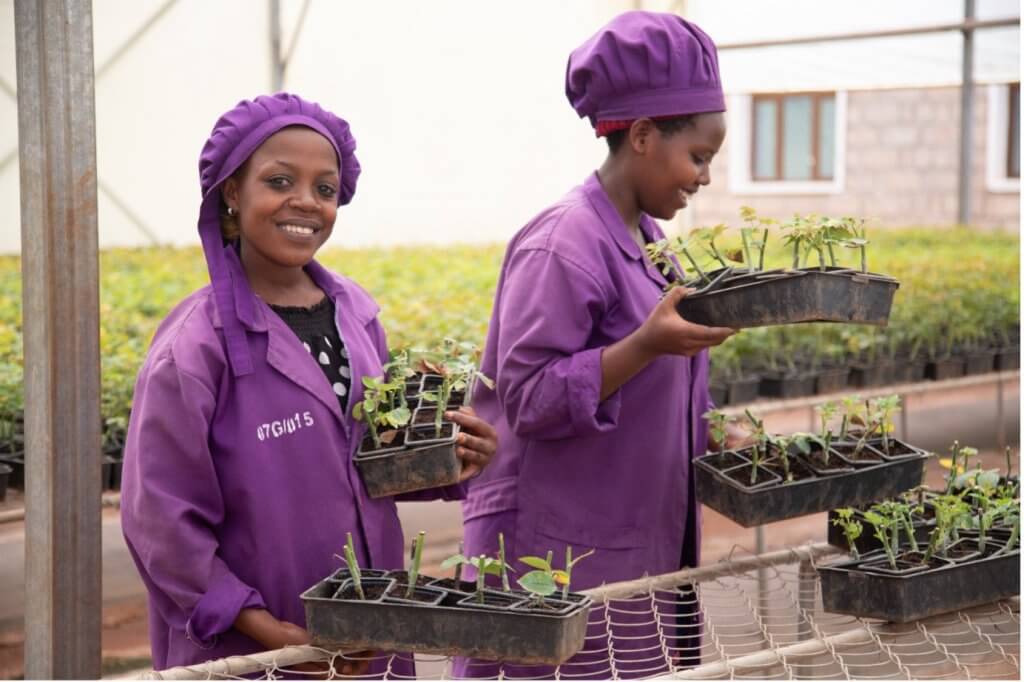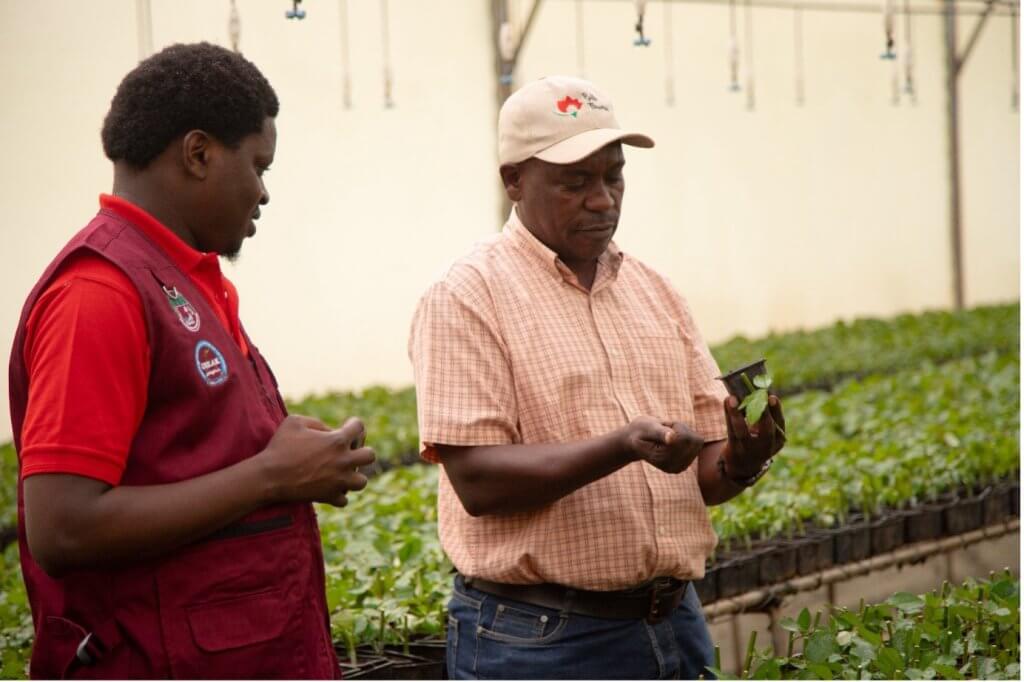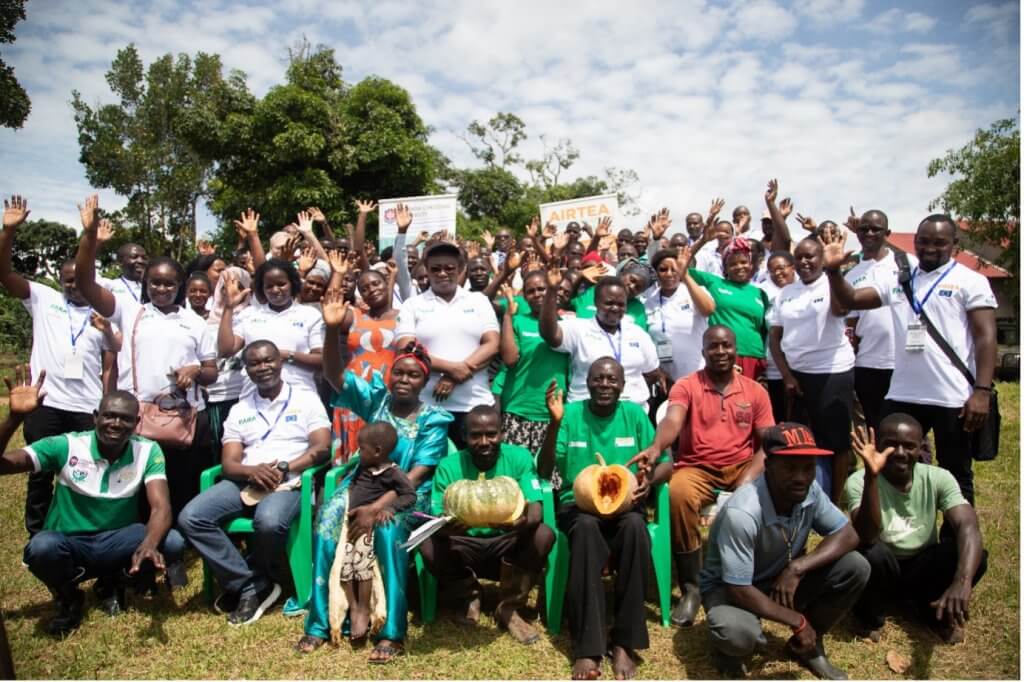Strengthening capacities of women and youth to adopt technologies and access markets

Youth benefiting from the AIRTEA Project in Rwanda.
By Ben Ilakut; Joshua Okonya; Genevieve Apio
Despite the existence of private sector-led multi-stakeholder partnerships for public research institutions, academia, policymakers and civil society in bringing about sustainable transformative change in AR4D, the extent of impact on the ground leaves a lot to be desired. The sheer lack of concrete actions or proven models to effectively impact smallholders farmers in Eastern Africa, just as elsewhere in ECA, remains a daunting task for actors within the AR4D space.
To address the above problem, ASARECA in partnership with FARA and EAFF are using commodity-based innovation platforms (IPs) to strengthen the capacities of youth and women to adopt new technologies while linking them to local and international markets. This chain of actions is expected to increase household income and employment rate for smallholders’ farmers especially youth and women in Uganda, Kenya, and Rwanda.
The initiative is implemented under the “Strengthening Agricultural Knowledge and Ecosystem Innovation for Inclusive Rural Transformation in Eastern Africa (AIRTEA) project funded by the European Union (EU) – ACP Innovation Fund through the Office of the Organization of African Caribbean and Pacific States (OACPS).

Women and Youth Group supported under AIRTEA project in Uganda
Through the AIRTEA project, ASARECA, FARA, and EAFF have mobilized the capacities and resources of the 50 organizations to implement 11 innovation projects by consortia that include public agriculture research institutions, public and private universities, private sector firms, farmer organizations, ministries of agriculture and district local governments.
In the three countries, ASARECA, FARA, and EAFF coordinated the establishment and strengthening of IPs involving silver cyprinid fish, ware and seed potato, cassava roots and cuttings, maize, green technologies for pest and disease management, aquaculture, and extension service provision. The IPs are used by the 11 consortia to popularize and disseminate new agricultural technologies nationally and within Eastern Africa to improve the livelihoods of especially the youth and women.

Youth led Agriculture Extension and Advisory Services in Rwanda.
As a result, the following achievements have been realized in the project countries:
- Since 2022, the project has strengthened the capacities of 353 stakeholders in the following areas: (i) technical and financial project management, (ii) monitoring, evaluation and learning, (iii) institutionalization of IPs in national planning processes, (iv) mainstreaming gender into agricultural projects, (v) development of impact stories, and (vi) project management and leadership.
- A total of 1,133 fisher folks were trained on postharvest value addition of silver cyprinid fish at Dunga and Marenga beaches in Kenya.
- Five seed potato IPs were established in Musanze and Nyabihu district of Rwanda to disseminate two new potato varieties (Kazeneza and Cyerekezo). This was achieved through establishment of 55 demo plots at farmers’ fields to test the new varieties.
- Twenty-one (21) demonstration sites were identified and established at farm level Kenya and Rwanda and Uganda. Through the established demonstrations, 374 farmers were trained in rapid seed potato multiplication (140 in Kenya, 114 in Rwanda and 120 in Uganda).
- Over 2,000 farms in Machakos and Kitui counties of Kenya were digitized in 2022 and are now using the Crop Dig mobile app to diagnose maize crop health and apply sustainable green solutions to increase crop productivity.
- Two Dairy Innovation Centers (DICs) were established in Mityana, and Gomba districts of Uganda to promote the adoption of the zero-waste green dairying model among smallholder dairy farmers. The DICs are farmer-led and serve as IPs while promoting value-addition of milk, cow-shades, rainwater harvesting and storage facilities, biogas production and utilisation, production of high-value crops and fodder. By 2023, over 300 youth and women have been trained at the DICs.

- Over 500 farmers were mobilized to join IPs such as the vegetable production units and trained on optimization of value-added products through on farm demonstration gardens and field days in Mukono, Mityana, Luwero, Kayunga, Jinja and Bugiri districts of Uganda. Participating farmers were linked to reliable markets through contract farming to supply at least 40 tons of high-quality pumpkin seeds per month, a target VPU are struggling to supply. Members of vegetable IPs in Kakindu subcounty have begun investing heavily in pumpkin production and are reaping good returns on these investments. Profits from their pumpkin production since the AIRTEA project began have more than doubled.
- Two Agribusiness Incubation and Innovation Hubs were established in University of Lay Adventists of Kigali and YEAN offices in Kigali, Rwanda. The two hubs in Kigali are currently being used to train 87 ToT youth in production of agricultural extension video messages and several other printed KM products for use in the training and provision of private agricultural extension and advisory services to farmers in rural communities.
- Six digital connectors have been established in Bugiri, Uganda.
- Twenty acres of certified and improved cassava varieties (NAROCAS 1, UG120193 and MKUMBA) were planted in Northern Uganda to increase access to virus-free cassava seed. In addition, a total of 368 farmers and extension officers were trained on certified cassava seed production in Uganda, Kenya, and Rwanda in 2022.
- One national and nine zonal aquaculture IPs were established in Uganda in 2022. These platforms bring together different stakeholders including fish farmers, hatchery operators, traders, extension workers, researchers, input suppliers, local leaders, and financial institutions to identify solutions to common problems at each node of the aquaculture value-chain. These IPs are effectively linking the different value-chain actors to business opportunities in the aquaculture value-chain in Uganda.
